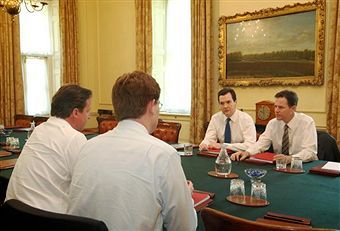 The government is on the defensive. The IFS’ pronouncement that the Budget was ‘regressive’ and the VAT hike ‘avoidable’ has given sustenance to the opposition and their
supporters in the media.
The government is on the defensive. The IFS’ pronouncement that the Budget was ‘regressive’ and the VAT hike ‘avoidable’ has given sustenance to the opposition and their
supporters in the media.
At the time, Harriet Harman’s response to the Budget seemed execrable. Now, I’m not so sure. Harman is like a Swordfish bi-plane attacking a battleship: she is so slow and obsolete that her superior opponents cannot bring their modern guns to bear. So she closes the range and scores a hit. Tuesday was one of her more successful strikes. As John Rentoul notes, Harman had a point beneath the bluster. The OBR is George Osborne’s weak spot; it downgraded growth forecasts in light of his Budget. It is being argued that Osborne is doing more harm than good. Why would he risk such regression? Ideology.
Up to a point, James’ analysis of the Budget vindicates that appraisal. Osborne hopes to create a block of Tory voters in marginal seats by promoting aspiration above dependency through cuts. Osborne is right but his strategy creates a short-term political problem: are the cuts necessary as well as ideological? No, argues David Blanchflower in an ideologically inspired analysis for the New Statesman. It’s standard Blanchflower: now is not the time to cut, ‘Slasher’ Osborne, double dip.
The coalition’s response to this onslaught has been confused; there has been too much emphasis on spurious cuts and savings in the future that no one can or should pre-empt ahead of the Spending Review. Roughly though, the coalition is on the right track. It is not progressive to tie the taxpayer to unsustainable borrowing, and plainly Britain is broke. The risks inherent in maintaining a fiscal deficit are greater than those associated with a double dip. Delaying deficit reduction will lead to punitive interest rates and a higher tax burden that will maroon the poor and middle income families for a generation. Therefore, the Budget is somewhat ‘regressive’ but necessarily so, to address Britain’s structural fiscal problems. The VAT hike was unavoidable because regressive cuts have not been swingeing – a point that Robert Chote, Director of the IFS, concedes in an interview with Fraser in this week’s magazine – so ‘avoidable’ in the sense that there was an alternative. Finally, is the risk of a double dip that great? The OBR’s growth downgrade from 2.6 to 2.3 percent hardly threatens apocalypse.






Comments